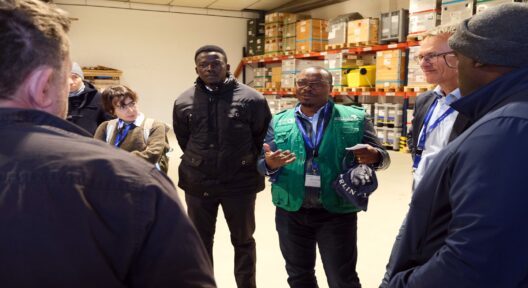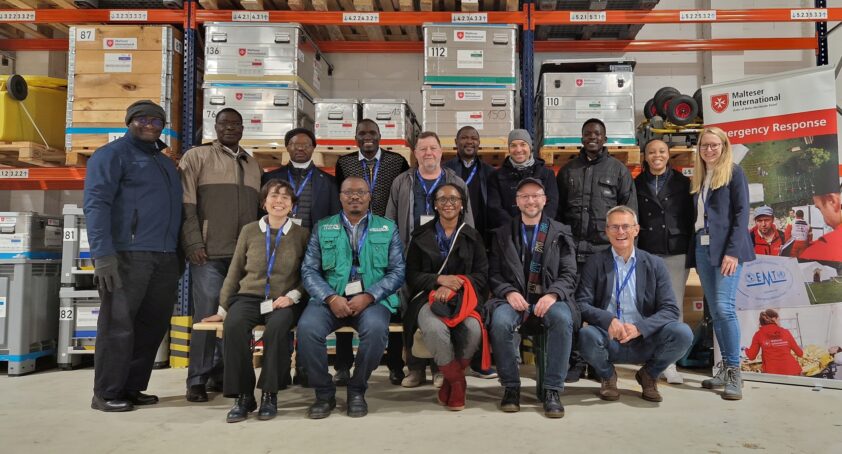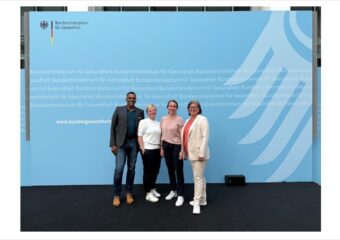Project Meeting in Support of Ugandan Roadmap Towards a National Emergency Medical Team
From 28 to 30 November 2023, representatives of the German relief organisation Malteser International and the Ugandan Ministry of Health met for a workshop in Frankfurt am Main in Germany. The Robert Koch Institute hosted this event since it forms an essential part of its GHPP project called “Emergency Medical Teams Twinning, Training, Transfer of Knowledge” (EMT TTT). The meeting aimed to jointly create an activity plan which will assist the Ugandan Ministry of Health in developing and convening a national Emergency Medical Team (EMT).

EMTs are essential professional medical resources in response to health emergencies as they provide direct clinical care to affected populations. Uganda aims to establish a national “EMT Type 1” equivalent to a primary health care facility and to capacitate it for infectious disease response.
The EMT partnership between Malteser International (MI) and the Ministry of Health (MoH) of Uganda is based on the Twinning-concept of the World Health Organization (WHO). Twinning pairs WHO-classified EMTs with international organisations or governmental institutions that are in the process of establishing or classifying an EMT. As such, they enable and facilitate peer-to-peer support and mutual learning. Based at the Robert Koch Insitute (RKI) unit Centre for International Health Protection-3 (Zentrum für Internationalen Gesundheitsschutz, ZIG-3), the team of the German National Focal Point for Emergency Medical Teams (EMT NFP) has been supporting Twinning partnerships under the umbrella of the Global Health Protection Programme (GHPP) since 2020.

Capacity development at system and network levels requires a multi-stakeholder engagement. Therefore, representatives from the WHO Country Office Uganda, the WHO Regional Office for Africa (AFRO) and the Africa Centres for Disease Control and Prevention (Africa CDC) also joined the Frankfurt meeting as part of the Twinning process.
The workshop agenda was composed of a range of formats. At first, the Ugandan Ministry of Health shared its EMT roadmap vision. It was followed by the WHO AFRO presenting a 10-step guidance for building national EMTs in the region. The Malteser International team presented the setup of their classified EMT and hosted a site visit at their EMT warehouse near the city of Wiesbaden. The purpose was to deliver a closer hands-on look at their logistical arrangement. Another central matter for discussion and decision-making was the following question: “What are the scenarios for an EMT setup responding to infectious diseases?”
Finally, in a room filled with ideas and colourful cards, an EMT Twinning activity plan was jointly drawn for 2024 and 2025. The project members agreed to address activities supporting the development of the Ugandan EMT’s Standard Operating Procedures (SOPs). Furthermore, they decided to develop and pilot a training on Infection Prevention and Control (IPC) in the EMT context.
Because partnerships are also about cultures, the evenings were used by the workshop attendees to explore together the large Christmas markets in the cities of Frankfurt and Wiesbaden. In this way, along with the first snow of the season, the guests from the African continent experienced an authentic piece of German culture.
The workshop marked the last Twinning on-site project activity of 2023. How the implementation of the project will unfold from a plan into reality is going to show over the coming two years through the joint efforts of all project partners.



